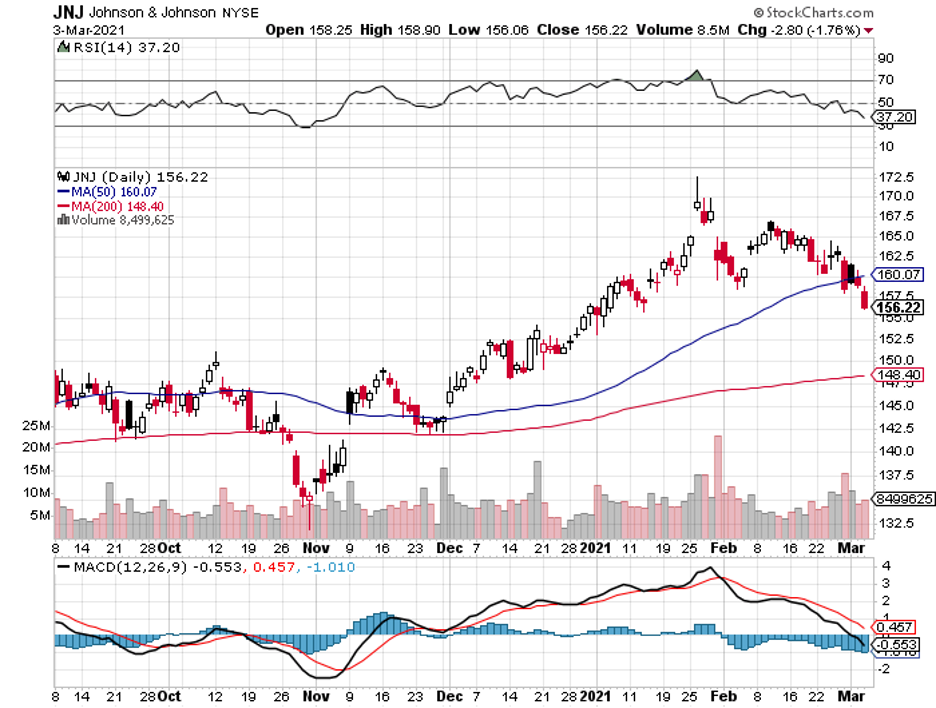Are We There Yet: How the JNJ Vaccine Could Be the Answer
Since the pandemic started, we’ve had two extremely similar COVID-19 vaccines approved: the mRNA vaccines created by Moderna (MRNA) and Pfizer (PFE) / BioNTech (BNTX).
Now, there’s another coronavirus shot that gained FDA approval: Johnson & Johnson’s (JNJ) adenovirus jab.
In fact, JNJ’s candidate received a unanimous approval from the FDA—a first among the COVID-19 vaccine developers.
Results showed that JNJ’s shot has 66% effectivity at preventing coronavirus infections and 85% effective at blocking severe COVID-19 cases when allowed at least four weeks to take effect.
Taken at face value, the numbers from JNJ’s trials may not seem as impressive as the two-shot vaccines of Moderna or Pfizer, which both demonstrated efficacy results of over 94% in their 2020 reports.
However, it’s important to not make any conclusions based on incomplete data.
After all, drawing comparisons among different vaccine studies performed at different periods is practically comparing apples to oranges.
That’s why Dr. Anthony Fauci and other experts declared that they’ll just take whichever vaccine shot they could avail of.
Actually, the JNJ vaccine may be the ideal option for some people.
Since the JNJ vaccine shows less severe reactions compared to Pfizer and Moderna’s vaccines, this could be preferable for people who couldn’t tolerate the side effects.
Although the side effects of Pfizer and Moderna are temporary, some people need to take days off to recover. Sadly, not everyone has the luxury to do that.
The fact that it’s a single jab vaccine makes it an attractive option for young and healthy individuals, who can’t afford to go back to get a second shot.
It’s also less fragile and can be stored in a regular fridge for three months without the need for any hyper-cold storage system like the mRNA vaccines require. This would make it an attractive option for rural areas.
Plus, JNJ tested its candidate at the height of the pandemic. That means the numbers the company released could have been affected by the situation at the time.
Although JNJ’s vaccine does not completely get rid of the disease, it delivers on the promise of protecting the patients from the worst possible scenarios of COVID-19: hospitalization and death.
Basically, the JNJ vaccine is cheap to manufacture as well as pretty simple to administer and get.
People can get some dependable viral protection within a span of four weeks, without the need to return for a second jab.
As a bonus, the JNJ vaccine could even protect you better from the new variants that are starting to spread fast.
Despite the $410 billion market capitalization of JNJ though, it looks like the New-Jersey-based giant isn’t up for the massive rollout the world expects from its vaccine.
This is where Joe Biden steps in.
With the goal of having every American vaccinated by the end of May, Biden tapped Merck—a fierce rival of JNJ—to help out with the production.
While Merck’s own COVID-19 vaccine program was shut down, this company remains the leading vaccine developer across the globe.
This means it knows a thing or two about fast-moving mass production during outbreaks—and this is exactly the kind of expertise JNJ needs.
If things work out, JNJ should be able to produce 94 million doses by the end of May—roughly 7 million doses ahead of what’s stipulated in its contract—and the full 100 million by June.
This arrangement isn’t anything new. Since the COVID-19 pandemic, competitors have been joining forces to find ways to put an end to the crisis.
In January this year, Sanofi (SNY) announced that it would be collaborating with BioNTech to help manufacture additional doses of the COVID-19 vaccine it developed with Pfizer.
When JNJ receives authorization from the EU as well, Sanofi would also be there to help with the production.
The JNJ vaccine could just be the escape hatch we’ve all been waiting for since the pandemic started.
With this FDA authorization, we’d be able to vaccinate millions more at a breakneck speed.


